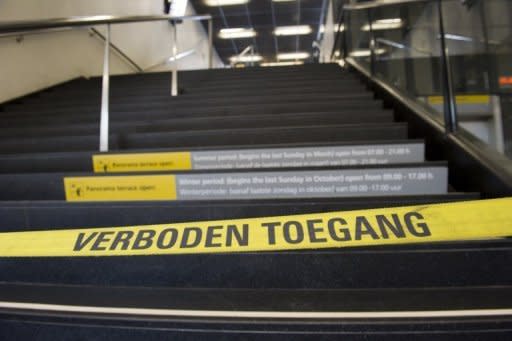'Miscommunication' triggers hijack alert at Amsterdam
Dutch authorities scrambled fighter jets Wednesday after the feared hijacking of an airliner but it turned out to be a false alarm that officials blamed on "miscommunication." Two F-16 warplanes were sent up to escort the Vueling flight from Malaga to Amsterdam with 180 passengers on board after it entered Dutch airspace without making radio contact. The first the pilot knew of the unfolding drama was when the fighter jets buzzed him, prompting him to ask: "Are we being hijacked?", the Dutch NOS public broadcaster reported. Military police responsible for security at Schiphol airport surrounded the Airbus A320 after it landed but eventually ascertained that everything was normal aboard, a spokesman said. The alert capped a day of high drama at Europe's fifth-largest airport after workers at an excavation earlier discovered a bomb dating back to World War II, prompting the partial evacuation of one of its busy terminals. "The report over the hijacking seemed to have been a miscommunication," Dutch police said in a tweet on their official Twitter account after the "hijack" incident. Spanish airline Vueling said there had been a "momentary loss of communication" between the aircraft and the ground. "The aeroplane lost communications with Schiphol and above all, it did not completely follow instructions," Dutch national anti-terrorism coordinating agency spokesman Erik Akerboom told the NOS, adding the plane did not stick to its flight plan. Vueling said in a statement that the Dutch authorities had "seen it fit to activate a security protocol due to the possibility that the safety of the aircraft could have been jeopardised due to a loss of communications". "Vueling is working with Dutch civil aviation authorities and with Schiphol to gather all the information...," it said, adding "at no time was there any danger to the 180 passengers on board." Dutch military police spokesman Martijn Peelen told AFP "we received news that a plane headed for the airport was accompanied by two F-16 fighters and no contact was possible. We were obliged to activate certain security protocols." He said after the Airbus landed at 2:30 pm (1230 GMT) it was approached by hostage negotiators, who were told by the pilot the situation was normal. Passengers later disembarked and were taken to a terminal by bus, he said. Dutch media also quoted passengers speaking from inside the plane via mobile phone as denying they had been hijacked. "There is nothing going on in here," one passenger told the NOS during a live broadcast. "Once down, the pilot told us there was nothing special going (in the plane) but something was happening at the airport," the passenger added. Spanish newspaper El Pais said on its website that it was not the first such incident involving a Vueling plane, which previously had to be escorted by a French fighter plane after radio contact was lost. The alarm came as Schiphol was coping with flight cancellations and delays after workers found a bomb dating back to World War II. Security personnel evacuated part of Terminal C as a precaution, while explosives experts tackled the bomb, removing it from the airport to allow disposal teams to detonate it safely. The terminal resumed normal operations by 4.00 pm (1400 GMT). Between 120,000 and 140,000 passengers pass daily through Schiphol, which was bombed at least twice during the war, first by the Luftwaffe during the German invasion in May 1940 and again by the Allies in December 1943.



